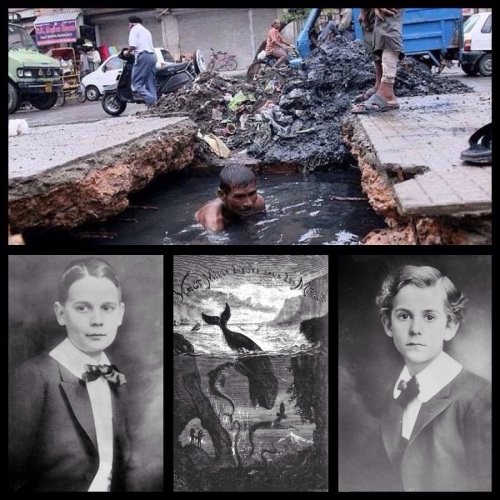Obnoxious pits and invisible walls: a call for solidarity
by snowden1984

This is a picture of a stranger. Standing chest deep in vile slime, naked but for cheap, loose fabric covering the groin, the noxious vapors almost overpowering the nasal sense, with sharp iron bars protruding from the sides of the pit, he is commissioned to clear the flow of sewage using his bare hands and perhaps a rude tool. Neither cruelty nor retribution is intended – the activity depicted is quite normal, as evidenced by the others in the frame going about their quotidian business.
How does this modern scene from the capital city of a nominally free democracy compare to a similar one from one of Hitler’s so-called education camps of the twentieth century? Eugen Kogon describes how the heirs to the throne of Austria-Hungary every day ferried primitive carts filled to the brim with human excrement. It must have splashed, it must have stank, they probably had no gloves – yet the brothers, members of the highest European aristocracy, performed their mean task ‘as if they had been doing it their entire lives’.
We can scarcely blame the royal princes, nor the bare-chested young man. The human survival instinct directs adaptation, and often, if not always, barters away even the most cherished values for a few more hours of existence of the self and loved ones. Examples of both steadfastness as well as capitulation in extreme circumstances, while worthy of respect or moving, are of little use as a basis for prescribing ethical behavior, as we are not really free when in extreme circumstances. However, perhaps there is value in reminding ourselves that extreme circumstances do exist.
An SS concentration camp with a guarded perimeter – hateful Lager – is a terrible construct, but far, far worse is the Lager without tangible walls. Evidence suggests that societies around the world even today are riddled with such open camps, where denizens have to submerge themselves in feces, as in our picture, or are mishandled by policemen, bombed by drones, shut up in dingy rooms, buried by the collapse of unsafe buildings, exposed to the elements, starved of food, given contaminated water, denied medical assistance, excluded from housing, segregated, discriminated against in terms of price and access to services, humiliated and exploited. Membership is decided on the basis of their nationality, religion, gender, ethnicity, caste, sexuality, material wealth, disability, language, accent, political opinion, age, health, ignorance of rights, or physical appearance. Almost paradoxically, these Gulags-without-walls-or-overseers often coexist with regions of intellectual honesty, nominal equality, wasteful luxury and strong sympathy.
Let us return to feces-man and quote Jules Verne:
“Cet Indien, monsieur le professeur, c’est un habitant du pays de opprimés, et je suis encore, et, jusqu’à mon dernier souffle, je serai de ce pays-là!”
(“This Indian is an inhabitant of an oppressed land, and I stand, and shall do so until my last breath, as one of them!”)
Written in the nineteenth century, Verne’s words have little to with this particular Indian – but nothing prevents us from extrapolating their spirit, for we are concerned with the right of every single human being to live with dignity, in freedom, and with access to justice. Lenin, the intellectual with the neat beard, who countenanced a few dozen murders to hasten the workers’ paradise which, when it came about, was not a little blemished by slave camps, police arbitrariness, and an incongruous ban on strikes, once famously asked, “What is to be done?” Our answer is “Probably much”, but also to:
Allow that wishing things to stay the same might be an abomination;
Tolerate poor etiquette in those attempting to escape such invisible chains;
Examine calls for allegiance based on divisions such as nationality, religion, ethnicity, language, gender, sexuality, wealth, or caste, in case it leads to the oppression of those excluded.
While we grapple with turning away from the long-sanctified themes of nationalism, favoring co-religionists, discriminating against people with the wrong skin color, or the wrong language, let us remember that the gentleman in the picture is still alive. Not for long, of course, for the acerbic fluids must eat into his dark skin, and daily degradation probably saps the will to survive. Perhaps he shall yet break out of his unbounded prison, for public opinion is slowly being mobilized – but for the general case, as in this appeal. Neither the photographer nor the wretched subject himself has been compensated for the reproduction of the image, nor their permission solicited. This law we shall with impunity break, this assault on privacy condone – if it only helps to bring about a slightly more just world. In any case, this is a picture of us.